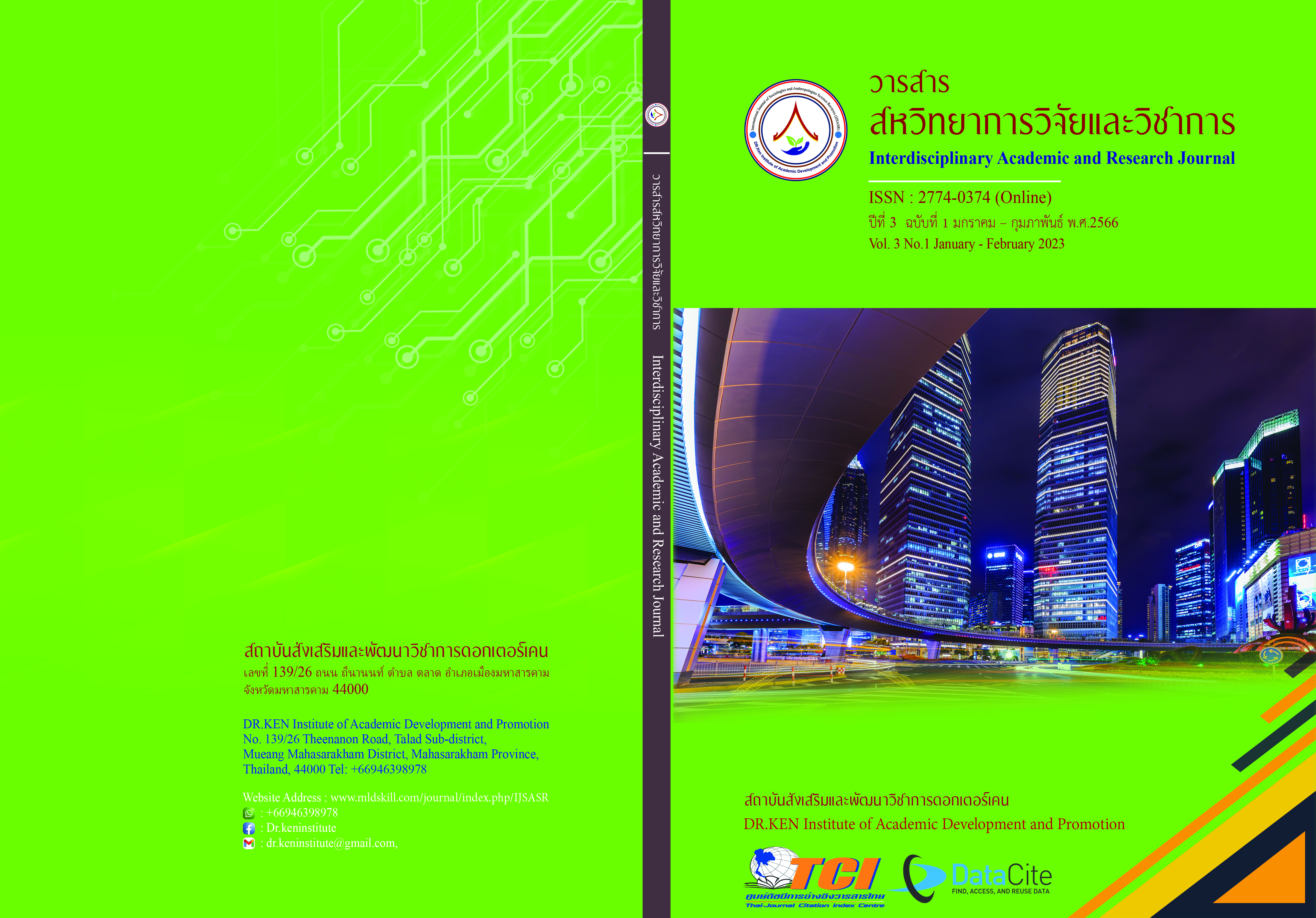The Expectation for Academic Leadership of School Administrators under Vocational Education Chachoengsao Province
DOI:
https://doi.org/10.14456/iarj.2023.49Keywords:
Expectation; , Academic Leadership; , Teachers; , School AdministratorsAbstract
The vocational education reform aims to provide quality vocational education, learners have the potential expected by enterprises, and the management of quality education must begin with the management of quality educational institutes that make full use of available resources to their full potential. Therefore, administrators must have knowledge and expertise in various matters as consultants, working with teachers, motivating teachers to advise teachers, and coordinating all teachers to work together with communication skills, transfer, techniques quality, this will result in the most effective academic administration of educational institutions. The purposes of this research were (1) to study teachers' expectations of academic leadership of school administrators under vocational education in Chachoengsao Province. And (2) compared the levels of teachers' expectations of academic leadership by sex, age, and educational background. The sample in this research was 229 personnel in vocational education institutes in Chachoengsao Province. The research instrument was a questionnaire on teachers' expectations of academic leadership of school administrators. The statistics used in the research were frequency, mean, percentage, standard deviation, F-test, and t-test. The results showed that (1) Teachers' expectations of academic leadership of school administrators under vocational education in Chachoengsao Province overall were at a high level. And (2) the results of a comparative analysis of teachers' expectations of academic leadership of school administrators under vocational education in Chachoengsao Province, both overall and in terms of findings; (a) classified by gender as a whole and not different from each other, (b) classified by age as a whole and in each aspect without a difference, and (c) classified by educational qualifications, there was no difference, for knowledge, there was a statistically significant difference at the 0.05 level.
References
เกตุสุดา กิ้งการจร. (2560). ภาวะผู้นำทางวิชาการของผู้บริหารสถานศึกษา สังกัดสำนักงานเขตพื้นที่การศึกษามัธยมศึกษา เขต 4 สระบุรี. ศึกษาศาสตรมหาบัณฑิตสาขาวิชาการบริหารการศึกษา: คณะศึกษาศาสตร์ มหาวิทยาลัยเทคโนโลยีราชมงคลธัญบุรี.
กมลชนก ธงทอง. (2564). ภาวะผู้นำทางวิชาการ. กรุงเทพฯ : มหาวิทยาลัยราชภัฏสวนสุนันทา.
ณพัฐธิกา ปิติเลิศศิริกุล และนิรุทธิ์ นันทมาศวังนรา. (2565). ภาวะผู้นำทางวิชาการของผู้บริหารสถานศึกษาที่ส่งผลต่อประสิทธิผลการประกันคุณภาพภายในของสถานศึกษา โรงเรียนกลุ่มบันนังสตาสังกัดสำนักเขตพื้นที่การศึกษาประถมศึกษายะลา เขต 2. วารสารรัชต์ภาคย์, 15(39),137-148.
ณัฐสิฏ รักษ์เกียรติวงศ์. (2558). การปฏิรูปอาชีวศึกษาของประเทศไทย. กรุงเทพฯ : สถาบันการวิจัยเพื่อพัฒนาประเทศไทย.
ธนพัฒน์ ลิ้มไพบูลย์. (2565). ภาวะผู้นำทางวิชาการในศตวรรษที่ 21 ของผู้บริหารสถานศึกษาขั้นพื้นฐาน สังกัดสำนักงานเขตพื้นที่การศึกษามัธยมศึกษาสุพรรณบุรี. Journal of Roi Kaensarn Academi. 7(1), 36-48.
บุญชม ศรีสะอาด. (2553). การวิจัยเบื้องต้น. พิมพ์ครั้งที่ 8. กรุงเทพฯ : สุวีริยาสาส์น.
รวิภา ศรีวัตร. (2564). แนวทางการพัฒนาภาวะผู้นำทางวิชาการของผู้บริหารสถานศึกษาในศตวรรษที่ 21สังกัดสำนักงานเขตพื้นที่การศึกษาประถมศึกษาเลย เขต 2. วารสารศรีล้านช้างปริทรรศน์. 7(2), 39-51.
สกุณา โพกระสังข์. (2565). ภาวะผู้นำทางวิชาการของผู้อำนวยการโรงเรียนเอกชนในจังหวัดศรีสะเกษ.วารสารสถาบันวิจัยและพัฒนา มหาวิทยาลัยราชภัฏมหาสารคาม. 9(1), 453-462.
สำนักงานศึกษาธิการจังหวัดฉะเชิงเทรา. (2565). ข้อมูลบุคลากรของสำนักงานศึกษาธิการจังหวัดฉะเชิงเทรา. ฉะเชิงเทรา : สำนักงานศึกษาธิการจังหวัดฉะเชิงเทรา.
Glickman, D. (2007). Supervision and instructional Leadership: A developmental approach. 7th edition. Boston: Pearson international ed.
Krejcie, R. V. & Morgan, D. W. (1970). Determining Sample Size for Research Activities. Educational and Psychological Measurement, 30(3), 607-610.
Downloads
Published
How to Cite
Issue
Section
License
Copyright (c) 2023 ศรีโสภา คูประพัทธ์พงศ์

This work is licensed under a Creative Commons Attribution-NonCommercial-NoDerivatives 4.0 International License.
Copyright on any article in the Interdisciplinary Academic and Research Journal is retained by the author(s) under the under the Creative Commons Attribution-NonCommercial-NoDerivatives 4.0 International License. Permission to use text, content, images, etc. of publication. Any user to read, download, copy, distribute, print, search, or link to the full texts of articles, crawl them for indexing, pass them as data to software, or use them for any other lawful purpose. But do not use it for commercial use or with the intent to benefit any business.
















.png)


